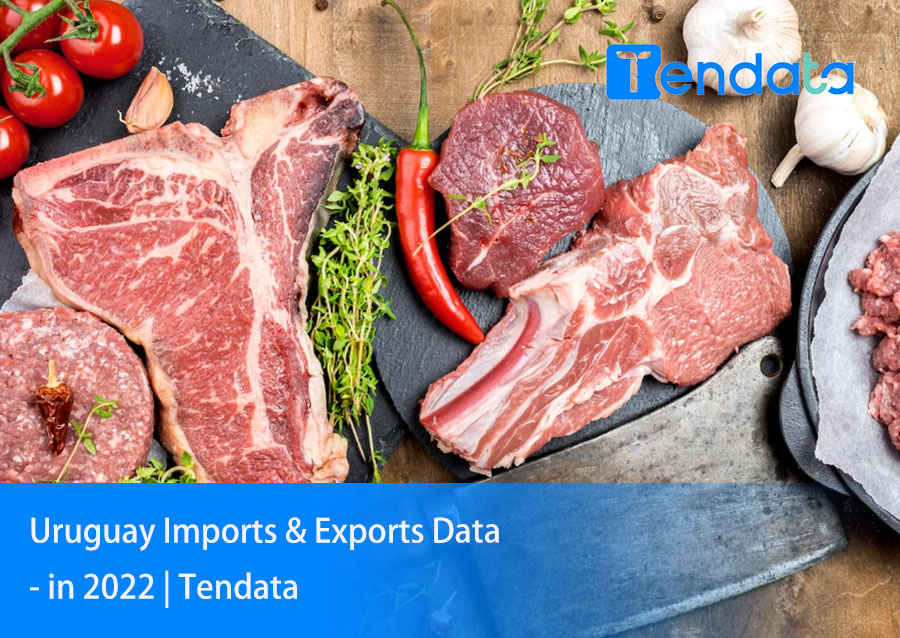 Trade Data
Trade Data
 26-12-2023
26-12-2023

Imports
In 2022, Uruguay purchased $13 billion worth of imports from global suppliers. The value of Uruguay's imports increased by 25.7% year-over-year compared to $10.3 billion in 2021.
The top 5 most valuable products imported by Uruguay in 2022 are crude oil, automobiles, processed petroleum, telephony equipment including smartphones, and nitrogen fertilizers.
Top International Suppliers of Uruguay's Imports
The latest country-specific data show that imports to Uruguay are sold mainly by exporters from Brazil (19.9% of Uruguay's total), mainland China (18.1%), the United States (15.8%), Argentina (11.5%), Nigeria (2.9%), Germany (2.3%), India (2.1%), Spain (2%), Mexico ( 1.9%), France (1.7%), Turkey (1.6%) and Italy (1.5%).
Uruguay's Top 10 Imports
1. Mineral fuels including oil: $2.2 billion (17.2% of total imports)
2. Vehicles: $1.5 billion (11.2%)
3. Machinery including computers: $1.3 billion (9.7%)
4. Motors, equipment: $878.8 million (6.8%)
5. Fertilizers: $701.3 million (5.4%)
6. Plastics, plastic products: $650.3 million (5%)
7. Other chemicals: $450.4 million (3.5%)
8. Pharmaceuticals: $360.4 million (2.8%)
9. Meat: $299.6 million (2.3%)
10. Iron and steel products: $242.6 million (1.9%)
Uruguay's top 10 imports accounted for 65.7% of its total purchases from other countries.
Uruguay's fastest growing imports are fertilizers (up 58.6% from 2021), mineral fuels including oil (up 51.3%), and then vehicles (up 34%). Uruguay's slowest growing imports are steel imports (up 13.1% from 2021) and plastic materials and plastic products (up 13.3%).
Exports
Uruguay exports products worth $11.2 billion to the world in 2022. This represents a 17.3% year-over-year increase in the total value of Uruguay's exports compared to $9.54 billion in 2021.
Uruguay's Best Export Customers
The latest country-specific data shows that Uruguay's exports are mainly purchased by importers from the following countries: mainland China (21.5% of Uruguay's total), Brazil (15.0%), Argentina (8.1%), the United States (6.2%), the Netherlands (2.6%), Algeria (2.0%), Mexico (1.8%), Chile (1.5%), Paraguay ( 1.3%), Egypt (1.2%), Portugal (1.1%) and United Kingdom (0.9%).
Uruguay's top 10 exports
1. Meat: $2.9 billion (25.8% of total exports)
2. Oilseeds: $2.1 billion (19.1%)
3. Timber: $1.1 billion (9.7%)
4. Dairy products, eggs, honey: $894.8 million (8%)
5. Cereals: $819.1 million (7.3%)
6. Vehicles: $438 million (3.9%)
7. Plastics, plastic products: $352.8 million (3.2%)
8. Animal and vegetable fats, oils, waxes: $293.4 million (2.6%)
9. Milling products, malt, starch: $289.5 million (2.6%)
10. Pharmaceuticals: $184.6 million (1.6%)
Uruguay's top 10 exports accounted for 83.9% of its total global exports.
Automobiles are the fastest growing of Uruguay's top 10 export categories, growing 128.2% from 2021 to 2022. The second highest growth in export sales is in oilseeds, up 114.9%. Uruguay's exports of animal and vegetable fats, oils and waxes grew the third fastest, by 39.1% compared to 2021.
Uruguay's top 10 export category with the smallest growth was pharmaceuticals, up 2.1%.
At a more granular four-digit HS code level, Uruguay's most valuable exports in 2022 are frozen beef (19 % of Uruguay's total exports), soybeans (17.2 %), logs (6 %), concentrated or sweetened milk cream (5.5 %), rice (4.5 %), fresh or chilled beef (3.9 %), trucks (2.8 %), malt (2.5 %), wheat (2.1%), and then red meat offal (1.8%).
1. Are Free Customs Data Useful?
In the current market, customs data come in two varieties: paid and free. As far as Tendata is aware, many customs data companies claim to have developed a free customs data system, but their core objective is to attract traffic and profit through secondary marketing.
In the current state of the industry, free customs data is primarily superficial public data. In this age of data, valuable information cannot be free. Tendata Data suggests it's better to spend money to purchase it, as Jack Ma once said, "Free is actually the most expensive." (>>> Click to get free customs data from 91 countries.)
2. Customs Data Ineffective? You Might Not Be Using It Right
Many customers often feel that customs data is ineffective or that they're only using a small portion of it when working with import and export data. Tendata Data would like to reiterate the eight major functions of customs data for the benefit of our foreign trade enterprises:
You can find all of these functions in customs data (>>> Click to access sample data online). If you can find them, you're a qualified data user. In addition to this, Shanghai Tendata's Foreign Trade Big Data Business Radar helps foreign trade enterprises manage potential customers online in real-time, understand customer needs, and assists foreign trade personnel in accurately searching for foreign trade customer emails, sending mass emails, producing email reports, and solving email sending dilemmas.
3. Customs Data ≠ Foreign Trade Data; Having Customs Data Alone Is Not Enough
Customs data inquiries include trade transaction data publicly available from customs around the world. This data consists of customs statistical bill-type information. However, what Tendata Company refers to as foreign trade big data goes far beyond mere customs data.
Tendata iTrader boasts customs data from 91 countries, commercial data from 218 countries, and internet data. It encompasses information on over 1.8 billion global businesses, with 100 billion trade data points scrolling every day. It can rapidly and intelligently filter out contact details for 1.21 million executives and decision-makers, including email addresses, phone numbers, social media profiles, and more. It also simultaneously displays company yellow pages, product images, and websites, while offering 17 types of visual reports to help foreign trade enterprises accurately analyze and position themselves in the market, allowing you to quickly find precisely what you need in terms of buyers and suppliers.(>>> Click to use the data for free online.)
Category
Leave Message for Demo Request or Questions


 T-info
T-info T-discovery
T-discovery

 My
Tendata
My
Tendata Market Analysis
Market Analysis Customer
Development
Customer
Development Competitor
Monitoring
Competitor
Monitoring Customer Relationship
Customer Relationship






































































































































